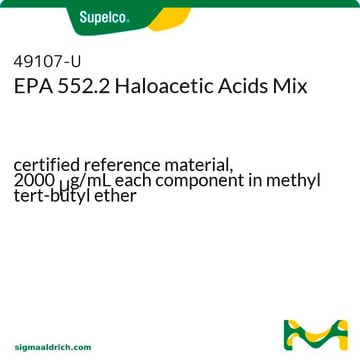242357
Dibromoacetic acid
97%
Sinónimos:
2,2-Dibromoacetic acid, DBAA
About This Item
Productos recomendados
Quality Level
assay
97%
form
solid
bp
128-130 °C/16 mmHg (lit.)
mp
32-38 °C (lit.)
density
2.382 g/mL at 25 °C (lit.)
functional group
bromo
carboxylic acid
SMILES string
OC(=O)C(Br)Br
InChI
1S/C2H2Br2O2/c3-1(4)2(5)6/h1H,(H,5,6)
InChI key
SIEILFNCEFEENQ-UHFFFAOYSA-N
¿Está buscando productos similares? Visita Guía de comparación de productos
Categorías relacionadas
Application
- Forthe stereoselective synthesis of (E)-α, β-unsaturated carboxylic acidsby samarium diiodide (SmI2) catalyzed reaction with aldehydes.
- Tosynthesize sodium bis(2-pyridylthio)acetate ligand by reacting with 2-mercaptopyridinein the presence of NaOH.
Other Notes
signalword
Danger
Hazard Classifications
Acute Tox. 4 Dermal - Acute Tox. 4 Inhalation - Acute Tox. 4 Oral - Aquatic Chronic 3 - Eye Dam. 1 - Skin Corr. 1B
Storage Class
8A - Combustible corrosive hazardous materials
wgk_germany
WGK 3
flash_point_f
235.4 °F - closed cup
flash_point_c
113 °C - closed cup
ppe
Eyeshields, Faceshields, Gloves, type P3 (EN 143) respirator cartridges
Elija entre una de las versiones más recientes:
¿Ya tiene este producto?
Encuentre la documentación para los productos que ha comprado recientemente en la Biblioteca de documentos.
Los clientes también vieron
Nuestro equipo de científicos tiene experiencia en todas las áreas de investigación: Ciencias de la vida, Ciencia de los materiales, Síntesis química, Cromatografía, Analítica y muchas otras.
Póngase en contacto con el Servicio técnico














